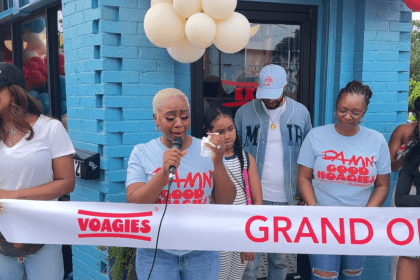[jwplatform VbzoWJUd]
What has been most rewarding aspect of leading this program?
It’s incredible. I am a mechanical engineer. I have moved through different careers around product development and marketing. And now, in my current position – creating programs that help youth, giving paths to success, especially around STEM. What’s most rewarding to me as someone who has two sons is giving these types of opportunities to kids they wouldn’t otherwise have and to see them grow. When I look at my sons, ages 16 and 12, they have participated in so many STEM programs. They’ve participated in [outstanding] initiatives where they get to build their confidence and gain new skills and I wanted to extend the opportunities to others kids.
The participants can not only design something using AutoCAD and create an app using App Inventor from MIT, but have mentors who can help them discover their purpose. Whether it’s a three or four-week program implemented by our HBCU partners, you see the kids grow into confident young men.
When visiting schools, parents will share how they see their kid in a different light. And that sometimes gets me emotional, but that’s the best part of the program.
Where did you earn your mechanical engineering degree?
At the University of Buffalo, I was the only Black female who graduated with a mechanical engineering degree that year. I know how tough it is. I know how difficult it is when you come from being what is called underserved – coming from not-the-best community, not having means and resources and being able to fight through that with grace and perseverance and building your confidence. When you hear the passion in my voice it’s because I am trying to get these kids on this path to success by providing the resources they need to get there. It’s really inspiring to me to see them move forward. It’s been a wonderful program.
What prompted you to become an engineer? Where did the drive and desire originate?
I am the youngest of five children. During my middle school years, I tinkered with things and was very interested in how things worked. I would think about how an airplane works, how a radio works and if I had the opportunity to open an appliance at home which was not always something my parents wanted me to do, I did that. My sister who is two years older was attending the University of Binghamton said,
“You do well in math and you really want to know how built things and how things work, why don’t you major in mechanical engineering?”
She reasoned after seeing engineers on campus the kind of work they were doing. I had never been exposed to anyone in engineering and didn’t have a full understanding of what engineers did but I just went for it. I loved it. Even when it got very tough and very challenging, I couldn’t think of anything else I wanted to do. I stuck to it.
We bring employees from Verizon to talk to the young men about careers, grit and perseverance. We bring the support to the kids so they have the exposure to the careers
With this segment, this population of kids, is when you talk to middle school-aged young men and ask them what they want to do and they bring up sports or entertainment. That’s where we connect with them. We tell them, “Oh, you’re interested in sports, let’s teach you design thinking. Let’s teach you how to design a safe helmet. You’re interested in entertainment; let’s talk about film and how STEM connects with film. It’s a way to meet them where they are and get them more interested in STEM careers versus I want to be a football player.”

Let’s talk about the #YouDontKnowMe campaign.
It’s an amazing campaign. I am so proud of it. As someone who has worked for Verizon for 12 years, I am extremely proud of Verizon for all of their support behind the types of program we create and this campaign. What I like about it is it really explores negative stereotypes of young men of color. You may walk down the street wearing a hoodie but you’re actually designing 3D products or you are using AutoCAD, which most people don’t even touch until college. You may have a hoodie on but you are creating robots. Today, it’s now about your skin color or your clothing. It’s really about what you have in your brain and what you want to be in the future. [We’re] trying to change those racial stereotypes out there. That’s what the video is all about.
Join the conversation: #YouDontKnowMe @verizongiving










